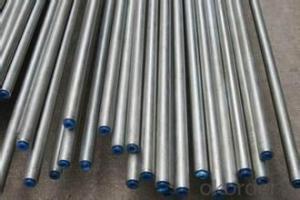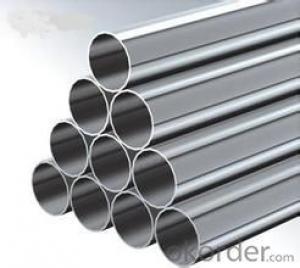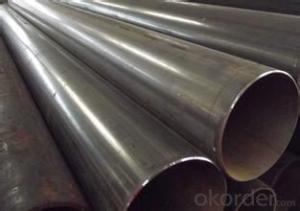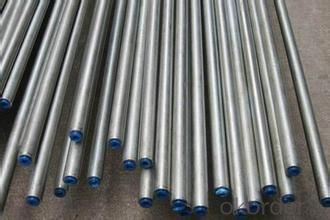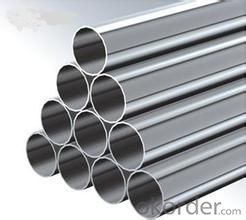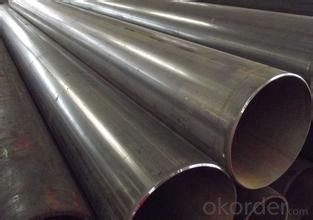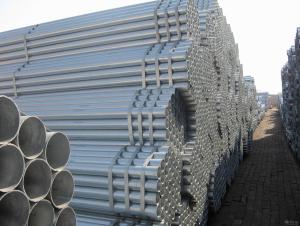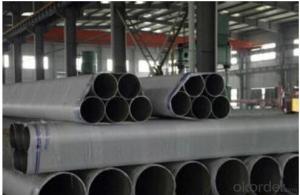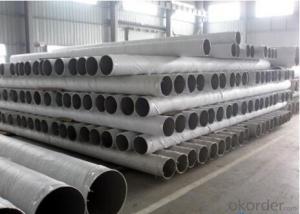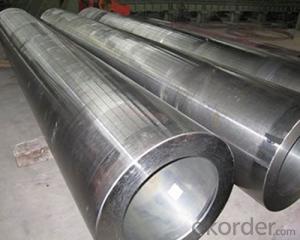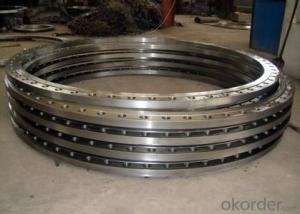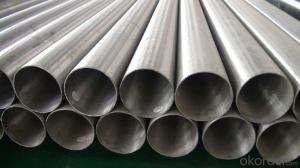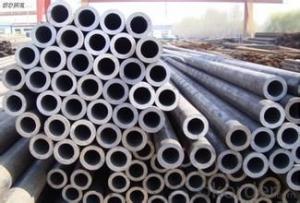Many varieties Stainless Steel Seamles Pipe 304 ASTM A312
- Loading Port:
- China main port
- Payment Terms:
- TT OR LC
- Min Order Qty:
- 20 m.t.
- Supply Capability:
- 5000 m.t./month
OKorder Service Pledge
OKorder Financial Service
You Might Also Like
Product Description:
1、Structure of Stainless Steel Seamles Pipe 304 ASTM A312 Description:
Stainless seamless pipe is formed by drawing a solid billet over a piercing rod to create the hollow shell. As the manufacturing process does not include any welding, seamless pipes are perceived to be stronger and more reliable. Historically seamless pipe was regarded as withstanding pressure better than other types, and was often more easily available than welded pipe.
2、Main Features of the Stainless Steel Seamles Pipe 304 ASTM A312:
• High manufacturing accuracy
• High strength
• Small inertia resistance
• Strong heat dissipation ability
• Good visual effect
•Reasonable price
3、Stainless Steel Seamles Pipe 304 ASTM A312 Images:
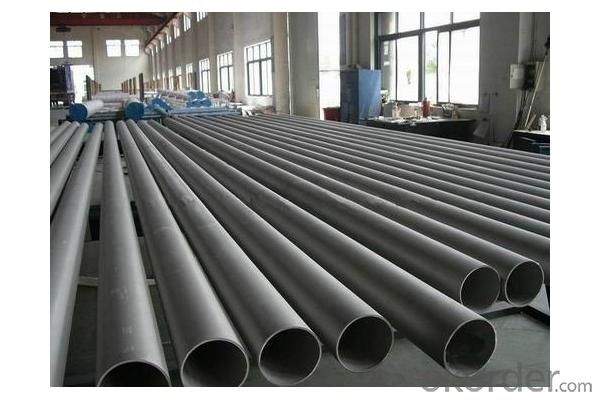
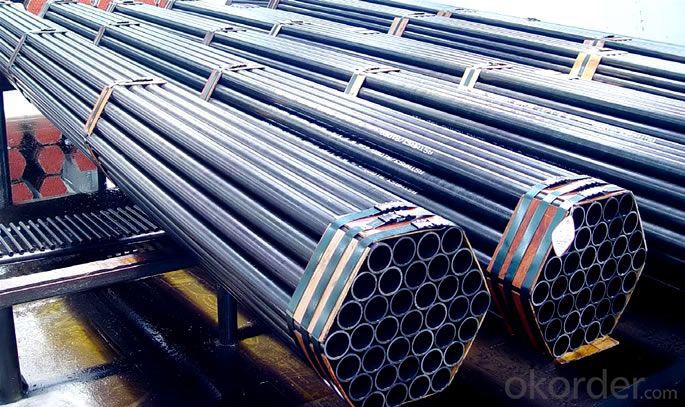
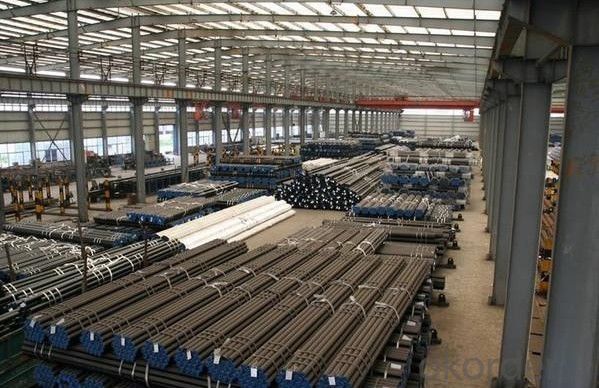
4、Stainless Steel Seamles Pipe 304 ASTM A312 Specification:
Experienced Lists of Standard |
Applicable Code No. |
Steel Grade |
ASTM |
A213, A269, A312, A789, A790, B677, A268 | TP304/L/H, TP310/S/H, TP316/L/H/Ti, TP317/L, TP321/H, TP347/H, S31803, S32205, S32750, S32304, S31500, TP904L, TP410, TP430, TP405, TP409/409L |
ASME |
SA213, SA312, SA789, SA790, SB677 | TP304/L/H, TP310/S/H, TP316/L/H/Ti, TP317/L, TP321/H, TP347/H, S31803, S32205, S32750, S32304, S31500, TP904L |
JIS |
JIS G3459, JIS G3463 | SUS 304TB, SUS304HTB, SUS304LTB, SUS310TB, SUS310STB, SUS316TB, SUS316LTB, SUS316TiTB, SUS317TB, SUS317LTB, SUS321TB, SUS321HTB, SUS347TB, SUS347HTB |
EN & DIN | EN 10216-5, DIN 17456, DIN 17458 | 1.4301, 1.4307, 1.4541, 1.4878, 1.4401, 1.4404,1.4571,1.4550,1.4438, 1.4436,1.4435, 1.4462, 1.4539, 1.4912, 1.4362 |
GB&GB/T | G B13296 G B/ T14976 | 0Cr18Ni9,00Cr19Ni10,0Cr18Ni10Ti,0Cr18Ni11Nb,0Cr17Ni12Mo2,000Cr17Ni14Mo2,0Cr18 |
Type |
O.D. |
W.T. |
Length | Bending Radius | Application Specification |
S.S Seamless Tubing |
3.17mm – 101.6mm |
0.5mm – 25.4mm |
Max. 22m |
/ | A213, A269, A511, A789; SA213, SA789, B677, SB677; JIS G3463; EN 10216-5 |
S.S. Seamless Pipe |
10.29mm – 355.70mm |
0.89mm – 50.0mm |
Max. 18m |
/ | A312, A790, SA312, SA790, JIS G3459, EN 10216-5 |
S.S. Seamless U-tube |
15.88mm – 76.1mm |
0.89mm – 7.14mm |
Max. 25m |
From 1.5 x OD To 1000mm | A213, A789, SA213, SA789, B677, SB677, JIS G3463, EN 10216-5, SA688 |
Testing:
(1) Hydro-Static Test
(2) Non-Destructive Test
(3) Ultrasonic Test
(4)Eddy-Current Test
5、FAQ of Stainless Steel Seamles Pipe 304 ASTM A312:
①How is the quality of your products?
Our products are manufactured strictly according to national and internaional standard, and we take a test on every pipe before delivered out. If you want see our quality certifications and all kinds of testing report, please just ask us for it.
Guaranteed: If products’ quality don’t accord to discription as we give or the promise before you place order, we promise 100% refund.
②How about price?
Yes, we are factory and be able to give you lowest price below market one, and we have a policy that “ for saving time and absolutely honest business attitude, we quote as lowest as possible for any customer, and discount can be given according to quantity”,if you like bargain and factory price is not low enough as you think, just don’t waste your time.Please trust the quotation we would give you, it is professional one.
③Why should you chose us?
Chose happens because of quality, then price, We can give you both.Additionally, we can also offer professional products inquiry, products knowledge train(for agents), smooth goods delivery, exellent customer solution proposals.Our service formula: good quality+good price+good service=customer’s trust
SGS test is available, customer inspection before shipping is welcome, third party inspection is no problem.
Any question, pls feel free to contact us !
- Q: What is the difference between steel pipes and PVC-U pipes?
- Steel pipes and PVC-U pipes differ in terms of their composition, strength, and suitability for different applications. Steel pipes are made from iron and carbon, making them strong and durable, capable of withstanding high pressure and extreme temperatures. They are commonly used for transporting liquids and gases in industries like oil, gas, and construction. On the other hand, PVC-U pipes are made from polyvinyl chloride, a plastic material. They are lightweight, easy to install, and resistant to corrosion and chemicals. PVC-U pipes are typically used for water supply, drainage systems, and irrigation.
- Q: Are steel pipes suitable for underground mining operations?
- Yes, steel pipes are suitable for underground mining operations. Steel pipes are known for their durability, strength, and resistance to corrosion, making them ideal for use in harsh underground mining environments. They can withstand high pressure and are capable of transporting various substances, such as water, air, or mining materials, with reliability and efficiency. Additionally, steel pipes can be customized to meet specific mining requirements, ensuring their suitability for underground operations.
- Q: How are steel pipes used in petrochemical plants?
- Steel pipes are extensively used in petrochemical plants for various purposes such as transporting fluids and gases, as well as providing structural support. These pipes are commonly utilized for the safe and efficient transfer of crude oil, natural gas, and other chemicals within the plant. They are designed to withstand high pressure, extreme temperature conditions, and corrosive environments, ensuring the integrity and reliability of the plant's operations. Steel pipes also play a crucial role in the construction of process equipment, such as reactors, distillation columns, and heat exchangers, providing a durable and long-lasting solution for the petrochemical industry.
- Q: How are steel pipes coated to prevent corrosion?
- Steel pipes are coated to prevent corrosion through a process called galvanization, where a layer of zinc is applied to the surface of the pipes. This zinc coating acts as a protective barrier, preventing the steel from coming into direct contact with moisture and other corrosive elements in the environment.
- Q: Can steel pipes be used for underground fuel pipelines?
- Indeed, underground fuel pipelines can utilize steel pipes for their construction. Steel pipes are widely favored for different pipeline applications owing to their exceptional durability, strength, and resistance to corrosion. In the case of underground fuel pipelines, steel pipes are particularly sought-after due to their capacity to endure significant pressure and fluctuations in temperature. Moreover, by shielding against external factors like soil shifts and chemical reactions, steel pipes offer exceptional safeguarding to the fuel transportation system, ensuring its safety and integrity. Through appropriate insulation and coating, the corrosion resistance of steel pipes can be further enhanced, solidifying their dependability as a choice for underground fuel pipelines.
- Q: What are the different types of thread connections used in steel pipes?
- The different types of thread connections used in steel pipes include tapered threads such as NPT (National Pipe Thread), BSPT (British Standard Pipe Taper), and API (American Petroleum Institute) threads. There are also parallel threads like BSP (British Standard Pipe) and G (ISO 228-1). These thread connections are used to join and seal steel pipes in various industries and applications.
- Q: What is the difference between steel pipe and ductile iron pipe?
- Steel pipe and ductile iron pipe are commonly utilized in various industries to transport fluids and gases. Nevertheless, there exist notable distinctions between the two materials. One primary difference lies in their composition. Steel pipe primarily consists of iron and carbon, with additional alloying elements to enhance strength and corrosion resistance. Conversely, ductile iron pipe is a form of cast iron that has undergone treatment to improve ductility and toughness. It contains higher levels of carbon and silicon, along with small amounts of other elements like magnesium and copper. Another difference is their strength and durability. Steel pipe is renowned for its high strength, enabling it to endure greater pressures and stresses compared to ductile iron pipe. It also exhibits superior resistance to impact and bending, making it suitable for applications requiring robustness. Ductile iron pipe, although not as strong as steel, still offers good strength and durability, particularly in scenarios involving external damage or heavy loads. Corrosion resistance is another crucial factor. Steel pipe typically exhibits greater resistance to corrosion due to the inclusion of alloying elements such as chromium and nickel. This renders it well-suited for applications prone to high corrosion risks, like pipelines carrying corrosive fluids. Ductile iron pipe, while possessing some corrosion resistance, may necessitate additional protective coatings to enhance its durability in corrosive environments. Installation and maintenance also differ between these two pipe types. Steel pipe is generally lighter and more manageable, facilitating easier installation. It also allows for welding, thereby providing greater construction flexibility. Ductile iron pipe, being a cast iron material, requires more specialized installation techniques such as mechanical joints or flanges. If mishandled, it is also more prone to cracking during installation. In terms of cost, steel pipe typically incurs higher expenses compared to ductile iron pipe. This stems from the higher cost of raw materials and the additional processing involved in steel pipe production. However, it is crucial to consider the overall lifecycle cost, as steel pipe's increased strength and corrosion resistance may result in lower maintenance and replacement expenses in the long run. In conclusion, while both steel pipe and ductile iron pipe have their respective advantages and applications, the choice between the two depends on factors such as strength requirements, corrosion resistance, installation methods, and budget considerations. Careful assessment of these factors will aid in determining the most suitable pipe material for a specific application.
- Q: Are steel pipes suitable for potable water applications?
- Yes, steel pipes are suitable for potable water applications. Steel pipes are commonly used for transporting water in various industries and municipal water systems. They are known for their durability, strength, and resistance to corrosion, making them a reliable choice for potable water systems. Steel pipes also have the advantage of being able to withstand high pressure and temperature conditions, making them suitable for both hot and cold water applications. Additionally, steel pipes can be easily welded, ensuring leak-free connections. However, it is important to note that the quality of the steel used and proper maintenance are crucial factors in ensuring the safety and suitability of steel pipes for potable water applications. Regular inspection and maintenance should be done to prevent corrosion and ensure the integrity of the pipes.
- Q: What are steel pipes?
- Steel pipes are hollow cylindrical tubes made from steel, which are mainly used for transporting fluids and gases in various industries such as oil and gas, construction, and plumbing. They are known for their strength, durability, and resistance to corrosion, making them an essential component in infrastructure and industrial applications.
- Q: What is the difference between steel pipes and fiberglass pipes?
- The main difference between steel pipes and fiberglass pipes lies in their composition and properties. Steel pipes are made of metal and are known for their strength, durability, and resistance to high temperatures and pressure. They are commonly used in industrial settings and for transporting liquids and gases. On the other hand, fiberglass pipes are made of glass fibers embedded in a resin matrix, providing them with excellent corrosion resistance, lightweight properties, and insulation capabilities. Fiberglass pipes are often used in applications where corrosion is a concern, such as in chemical processing plants or wastewater treatment facilities.
Send your message to us
Many varieties Stainless Steel Seamles Pipe 304 ASTM A312
- Loading Port:
- China main port
- Payment Terms:
- TT OR LC
- Min Order Qty:
- 20 m.t.
- Supply Capability:
- 5000 m.t./month
OKorder Service Pledge
OKorder Financial Service
Similar products
Hot products
Hot Searches
Related keywords
